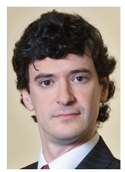‘When seeking opportunities abroad, we favour local firms for due diligence’
When Redes Energéticas Nacionais is looking for new business in foreign jurisdictions, it prefers to use lawyers that are close to the target of the deal, says Marta Almeida Afonso
Portugal’s Redes Energéticas Nacionais (REN) – a private electricity transmission and natural gas transportation and storage company – has embarked on an internationalisation drive, as part of the second phase of its reprivatisation process. To this end, the Lisbon-based listed company has already entered into strategic agreements with China’s State Grid and Oman Oil.
When deciding whether to use external advice or utilise the company’s in-house legal team to advise on such initiatives, REN makes its decision based on a number of factors, including the jurisdiction which the matter relates to and whether or not it concerns a new line of business, according to head of legal Marta Almeida Afonso. “When we have issues abroad, it depends on whether we are chasing a new opportunity, or whether it is a day-to-day case.” She adds that, when it comes to seeking new opportunities, REN outsources its due diligence work to an external law firm, relying on the analysis carried out by local lawyers, while the negotiation of the final purchase agreement and any subsequent agreements are carried out by both local lawyers and REN’s in-house legal team. “What we have done in the past is to use local firms, close to the transaction target, which do not have a presence in Portugal,” she says.
Almeida Afonso says that when REN is handling matters in Portugal the company usually uses its in-house legal team – given its knowledge of Portuguese law – and seeks advice from external law firms in relation to specific matters. However, when dealing with matters in other countries the company chooses “the best firm in the local market”. She adds: “If that law firm has a presence in Portugal, we can use the contacts here to make the local lawyers understand how important REN is in Portugal, although that is not a strict criterion.”
REN’s current strategy is to develop its business in the Iberian Peninsula and also enhance its involvement in interconnections between the peninsula and the rest of Europe and North Africa. In addition, the company is aiming to increase its international expansion, particularly in Mozambique and South America. REN is also active in telecommunications through Rentelecom, which provides infrastructure, managed services and consultancy.
Researching the market
What process does REN use when choosing a law firm? According to Almeida Afonso, when making its selection, REN does not carry out a tender process, but rather, takes the approach of researching which are the best law firms in the relevant area and requesting proposals from three of them, before choosing the most appropriate. However, she declines to name any of the law firms the company has used, and says that the projects concerned are not public.
With regard to contentious matters, the type of litigation REN is most likely to be involved in are land access disputes, according to Almeida Afonso. She adds that such disputes are common in Portugal, and REN is sometimes approached by Portuguese and Spanish law firms as potential service providers in relation to these types of cases.
The company’s in-house legal team comprises ten staff and focuses on regulatory and concession issues – it sometimes seeks to use external law firms for public tenders, large litigation cases and labour issues. In such instances, local firms or international firms with a presence in Portugal are preferred, given their expertise regarding the local market, Almeida Afonso says.
Currently, the company is eyeing South America – where REN sees the biggest potential opportunities – as the next region to target in its international expansion, Almeida Afonso says. It is public knowledge that REN is seeking transmission opportunities and last September, the company met for talks with Chile’s energy minister Máximo Pacheco to discuss possible participation in the market, though Almeida Afonso declined to comment. Chile recently approved a transmission law that will open up its grid to more private investment – this will, in turn, provide impetus to energy generation projects that have stalled due to transmission congestion. Meanwhile, REN is also seeking greater involvement in renewables having been granted a concession by the Portuguese government for its wave energy arm to operate a pilot wave power project.
Marta Almeida Afonso is head of legal at Redes Energéticas Nacionais.











